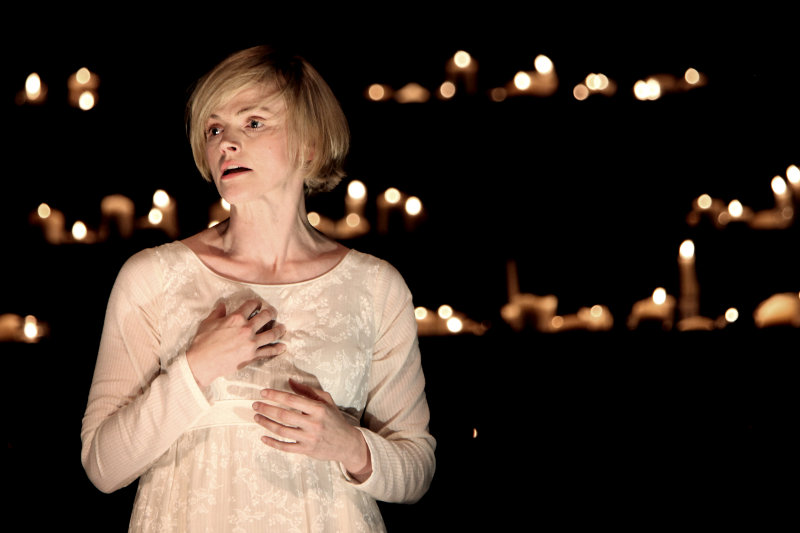The first time, as tragedy: 19 August, 1819 – magistrates order the cavalry in to a pro-democracy rally in St Peter’s Fields, Manchester, killing at least fifteen and wounding 700; the protest becomes iconic as the Peterloo Massacre.
The second time, as farce: 9 August, 2011 – rioters take over Manchester city centre; nobody, participants included, understands much what the protest is about.
The third time, as… poetry recitation.
The venue, just yards from the site of Peterloo, is new: a former Wesleyan chapel rescued from a purgatorial stint in mothballs as the dusty attic of a widely unmourned nitespot, and now gorgeously reborn as a theatre for Manchester International Festival. Back in 1910, the architect threw everything he had at the Albert Hall. Romanesque window arches shelter Arts and Crafts glass; swags of baroque stucco deck flock among plantations of cast iron pillars; quite possibly somewhere in the building lurks a kitchen sink, neoclassical yet groaning with putti. Magically however, this clatter of styles, this fantasy of no fixed historical abode, in all its cacophony and rapacity somehow coheres to achieve an unexpected and deeply affecting clarity: so, Maxine Peake’s performance.
Peake (to the gleefully partisan home crowd, she’s invariably just ‘Maxine’) claims the poet Shelley’s gale of protest at the Peterloo Massacre, ‘The Masque of Anarchy’, for her own, blasting through its 91 stanzas in 35 minutes. Astutely, she doesn’t hesitate to prose much of the poem, in defiance of the poet’s invitation to end stop and jingle rhymes. It’s a rough handling, but that’s how we show love in Manchester. The text is re-imagined as an aria di bravura, a coloratura eruption of whispers and cries, of thundering righteous exhortation and sobbing cadenzas thrumming with desolate vibrato. Each word is gnawed on hungrily for every morsel of hellfire, picked clean, marrow sucked and lips licked. It’s not a small vocal performance, not a polite one, and certainly not a safe one. There’s something exhilarating and, finally, irresistible about this sort of fearlessness and Peake’s authenticity and guts win the day. There are passages where the sense of the words lags behind the gallop, but her brio sweeps all before it. Had she simply unleashed this performance from a lectern on a bare stage, no more would have been needed to mint a festival highlight.
One suspects that director Sarah Frankcom sensed that minimalism in every other department would display this performance to best advantage, but somehow her better angels were shouted down and she embarked on the doomed project of decorating everything with minimalism deluxe. Thus Peake is saddled – after a dozen stanzas guardsman stock-still – with a meticulously synchronised stroboscopic catalogue of orators’ gestural tropes that she inhabits with visible awkwardness. When, just once, she brushes a hair from her face quite naturally, it’s a touchingly human punctum. She struts and frets and dispenses words one. Gesture. At. A. Time. – in empire-line cream (Regency yet contemporary, Brontë via H&M) – against tiers of lit candles. It’s a decorative enough scenic conceit (and has earned a solid ‘c’-grade for generations of GSCE Theatre Studies candidates) but its appeal to the sacred misunderstands the aptness of the venue, which is Shelleyan precisely in its transcendence of its devotional heritage: the point should have been that this isn’t a pulpit, but the hustings. Similarly, the attempt to unite performer and decor by having Peake enter and leave (through the groundlings in the stalls, and out onto the street – a smart touch) carrying a single frail candle is incongruous with the firebrand she wields in-between.
In a lapse that comes perilously close to undoing the whole enterprise, the lighting motif is a ground row of six power floods blazing upwards from Peake’s feet. Like a torch held beneath the chin to tell a spooky story, the effect is infernal, distorting her facial expressions into a gaunt rictus with vacant eye sockets. It’s certainly a mask of… something. Her every gesture is magnified into a shadow theatre of distraction, silhouettes chasing unfortunately across face and gown, and, least felicitously, projected at huge size on the back wall. At the nadir of the bathos she flings her arms wide and the organ pipes behind her sprout shadow wings. There are clanging colour choices and a cringe-inducing gobo, and the shame is all the greater because all of this is unnecessary. Frankcom’s trump card is in scheduling the performance for 9.30, to bracket the sunset. The glory of the 30 degree summer day’s crepuscular sizzle into twilight, and dying segue into halogen nocturnal cityscape, all seen through stained glass, is heart-stopping, a quietly elegant metaphor for the tide of history and a deft embedding of the piece into the city and a wider world.
No fewer than three programme notes urge the ‘dazzlingly obvious’ relevance of the poem to today, thereby managing to protest too much while protesting much too little. The audience tonight aren’t the people who were looting trainers as Miss Selfridge burned a couple of years back; these are the nice upstanding folks in their ‘I heart MCR’ t-shirts who cleaned up the next day, and it’s easy – cathartic, too – to get non-specifically fired-up about a retro-politics the sharp edges of which have been smoothed by history. For all Peake’s sincerity and brilliance, ultimately this is a homeopathic dose of protest in a capsule so sugarcoated Michael Gove would endorse the prescription. Meanwhile, elsewhere in the festival, Adam Curtis and Massive Attack are dispensing something much more artistically radical and astringent.
For more from Manchester International Festival see Total Theatre’s reviews of Inne Goris’ double-bill for children Once Upon a Story / Long Grass, Tino Sehgal’s installation work This Variation, and Robert Del Naja and Adam Curtis’ sweeping, potentially radical Massive Attack v Adam Curtis.

